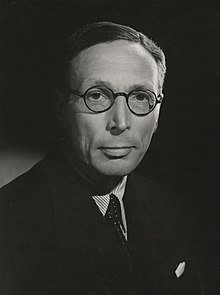
The following obituary by Noel Blakiston appeared in the Society’s Annual Report for 1974 at page 25.
“The death of Lord Conesford is deeply regretted by this Society. He was one of our most doughty champions in the causes for which we do battle. He was on the Council of the Chelsea Society 1946 to 1951 and was elected again in 1955. In April 1957, Basil Marsden-Smedley became Mayor and felt it inappropriate to hold both that office and the chairmanship of The Chelsea Society, Lord Conesford agreed to become our chairman until Basil was ready to come back, which he did in 1959. Lord Conesford then stayed on another two years as a member of the Society’s Council.
It is not possible here to enumerate the many occasions on which the Society benefited greatly from his knowledge or architecture, planning and the law, and those powers of lucid expression which went straight to the point. Let me mention three issues which, from his house in Cheyne Walk, were particularly close to his heart. Only a few weeks after he had become Chairman, the London County Council, without consultation, decided to demolish and reconstruct Albert Bridge. The letter that the Society sent the L.C.C. (see Annual Report 1957)and the words of our Chairman at a meeting with the L.C.C., will surely have done much to cause the latter to abandon its plans.
Then there was the matter of the Pier Hotel site (Annual Reports 1965 and 1966) when Lord Conesford added to that of the Chelsea Society his private representation at a Public Inquiry, without however obtaining happy results.
There followed the West Cross Route proposal and the subsequent Inquiry. The present Chairman owes an immense debt to Lord Conesford for his backing and professional advice in this affair. It was indeed an encouragement to have such a hard- hitting ally, and to hear Lord Conesford ask in the Lords, “Is the Minister aware that the proposals regarding Battersea Bridge are completely insane?”
And finally we were grateful to him for adding the weight of his authoritative voice to the evidence submitted at the Inquiry.
He remained interested in our affairs to the end, and was always ready to have a talk about them. He will indeed be missed.”
*********************
Henry George Strauss QC, 1st Baron Conesford (24 June 1892 – 28 August 1974) was a British lawyer and a Conservative politician.
Background and education
He was born at 19 Pembridge Gardens, Kensington, London, on 24 June 1892. He was the only son of Alphonse Henry Strauss, general merchant, and his wife, Hedwig Aschrott. He was educated at Rugby and Christ Church, Oxford, and was called to the Bar, Inner Temple, in 1919.[1][2] He briefly served during World War I, but was discharged because of health problems and continued working in Whitehall.
Political career
Strauss sat as Member of Parliament for Norwich between 1935 and 1945, for the Combined English Universities between 1946 and 1950 and for Norwich South between 1950 and 1955. He was Parliamentary Private Secretary (PPS) to the Attorney General, Sir Donald Somervell, between 1936 and 1942 and a government member as Parliamentary Secretary to the Ministry of Works between March and December 1942 and as Parliamentary Secretary to the Ministry of Town and Country Planning between 1942 and 1945, when he resigned from the government in protest at Churchill’s treatment of Poland at the Yalta agreement. He was once again a government member as Parliamentary Secretary to the Board of Trade under Churchill between 1951 and 1955. The latter year he was raised to the peerage as Baron Conesford, of Chelsea in the County of London.
In 1946 he published the book “Trade Unions and the Law”. From 1964 – 1970 he was the Chairman of the Association of Independent Unionist Peers. He also was the President of the Architectural club.
Lord Conesford was Chairman of The Chelsea Society from 1956-59. He became a Queen’s Counsel in 1964 and a Bencher of the Inner Temple in 1969. He was also a governor of Norwich High School for Girls and a vice-president of the Girls’ Day School Trust.
He was well known for his speeches in which he criticised the improper usage of the English language, especially in the United States, as can be seen in a Time Magazine article from 1957.
Lord Conesford married Anne Sadelbia Mary, daughter of John Bowyer Buchanan Nichols, in 1927. He died in August 1974, aged 82, and the barony became extinct.



